(U.S. Department of Energy Bioenergy KDF) The U.S. Department of Energy Bioenergy Technology Office's (BETO's) 2023 Billion-Ton Report (BT23) is an assessment of renewable carbon resources potentially available in the United States. BT23 explores these resources in terms of quantity, price, geographical density and distribution, and market maturity. Resource quantities in this report are limited by specified economic and environmental sustainability constraints. Good practices are needed to ensure biomass production has positive environmental outcomes.
BT23 supports BETO's mission, particularly the 2023 Multi-Year Program Plan. To access 2023 Billion-Ton Report PDFs, appendices, and high-level messages, navigate to the 2023 Billion-Ton Report landing page at https://www.energy.gov/eere/bioenergy/2023-billion-ton-report-assessment-us-renewable-carbon-resources (includes VIDEO) on the U.S. Department of Energy Bioenergy Technologies Office website.
To access information about the quality assumptions used in this report, please see the Biomass Feedstock Library at https://bioenergylibrary.inl.gov/Home/Home.aspx
Please cite the 2023 Billion-Ton Report as: U.S. Department of Energy. 2024. 2023 Billion‐Ton Report: An Assessment of U.S. Renewable Carbon Resources. M. H. Langholtz (Lead). Oak Ridge, TN: Oak Ridge National Laboratory. ORNL/SPR-2024/3103. doi: 10.23720/BT2023/2316165. READ MORE
This report and supporting documentation, data, and analysis tools are available online:
• Report landing page: https://www.energy.gov/eere/bioenergy/2023-billion-ton-reportassessment-us-renewable-carbon-resources
• Data portal: https://bioenergykdf.ornl.gov/bt23-data-portal
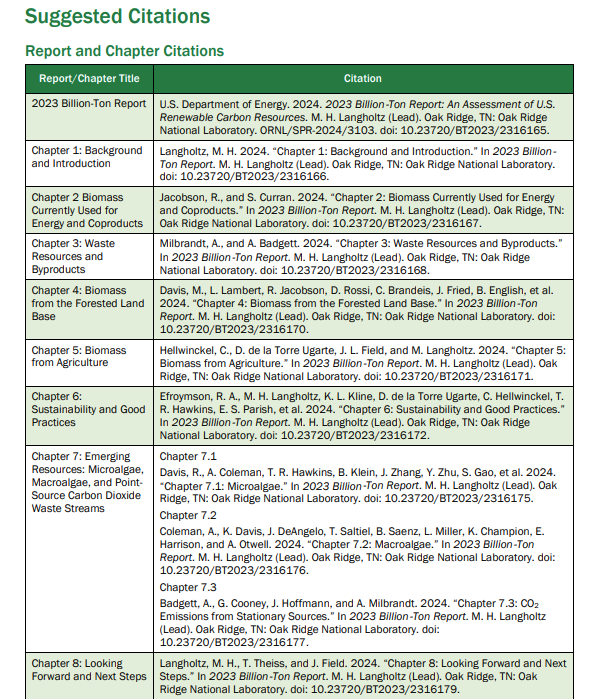
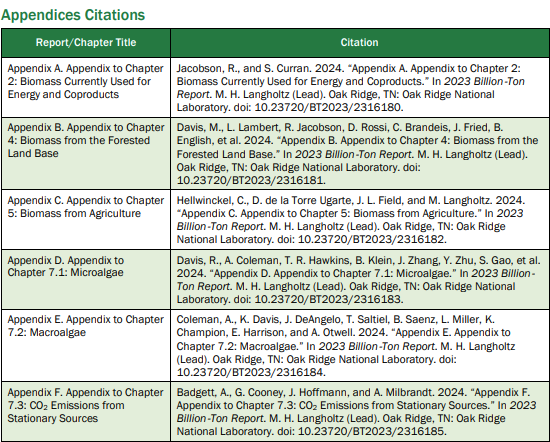
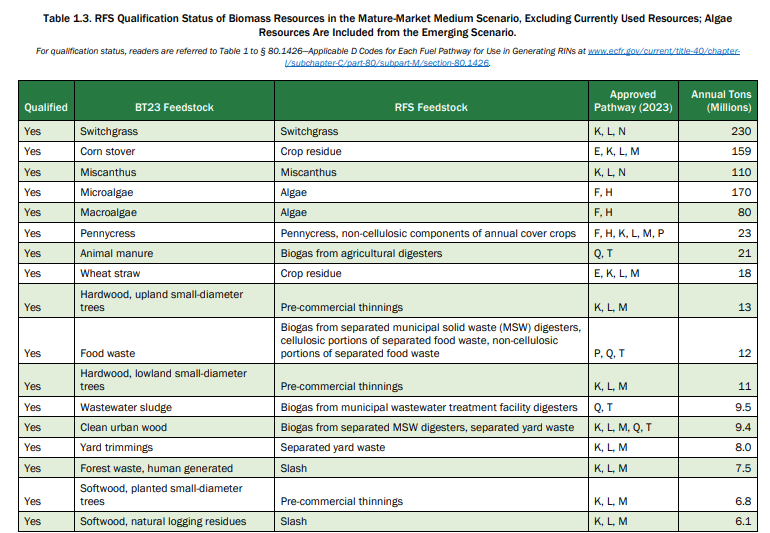
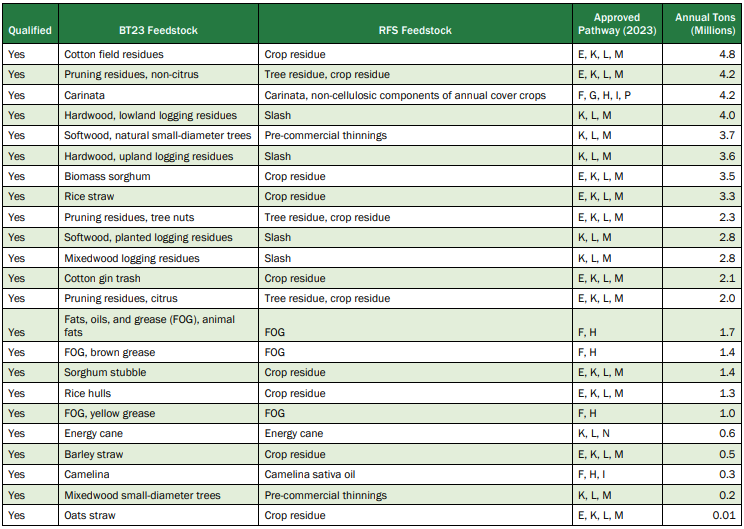
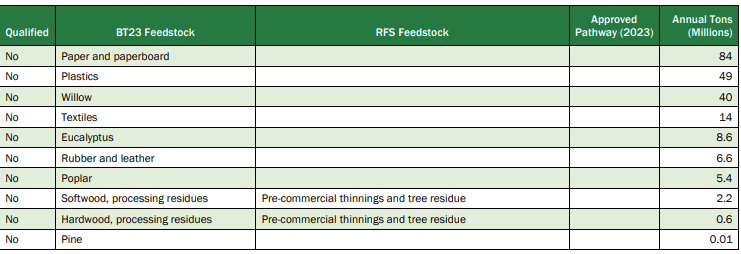
Related articles
- 2023 Billion-Ton Report: BETO Feedstock Project Lead Provides Insight on Pivotal Biomass Analysis (U.S. Department of Energy)
- The Digest’s 2024 Multi-Slide Guide to the DOE Billion Ton Report (Biofuels Digest)
- USIPA: DOE Report Finds Sustainable Forestry Pivotal To Increasing US Biomass Production (U.S. Industrial Pellet Association/Biomass Magazine)
- Now Available: 2023 Billion-Ton Report Webinar Recording and Presentations (U.S. Department of Energy; includes VIDEO)
- The Digest’s 2024 Multi-Slide Guide to the 2023 Billion-Ton Report (Biofuels Digest)
- Sky’s the limit for biofuels: Study confirms sufficient biomass potential to reach sustainable aviation fuel goals (EurekAlert!)
- Sky’s the limit for biofuels (Bioengineer)
- New Deep-Dive Video Resources on the 2023 Billion-Ton Report Now Available (U.S. Department of Energy)
Excerpt from U.S. Department of Energy: The U.S. Department of Energy (DOE) recently released a robust analysis, the 2023 Billion-Ton Report (BT23), demonstrating how America could sustainably triple its production of biomass to more than 1 billion tons per year while still meeting the projected demand for food, feed, fiber, conventional forest products, and exports.
BT23 is the fourth in a series of national biomass resource assessments since 2005. The report identifies feedstocks that could be available to produce biofuels to decarbonize transportation and industrial processes. The impact of this comprehensive analysis is far-reaching and DOE Bioenergy Technologies Office (BETO) Technology Manager, Dr. Mark Elless, managed the development of BT23 which was led by Oak Ridge National Laboratory.
“It is the seminal report for BETO and it’s nice to be associated with an assessment that’s widely cited and widely used,” said Dr. Elless.

2023 Billion-Ton Report: Decarbonizing Aviation
Notably, this report assesses the potential for the United States to produce enough biomass required for the production of sustainable aviation fuel (SAF). SAF is made from renewable biomass and waste resources and could deliver the same performance as petroleum-based jet fuel with a fraction of its carbon footprint, giving airlines solid footing for reducing greenhouse gas emissions from flight.
BT23 finds that the United States can sustainably produce over 1 billion tons of biomass, satisfying over 100% of the 2050 projected demand for airplane fuel in the country and allowing the U.S. to decarbonize the aviation industry with SAF. DOE is working with the U.S. Department of Transportation, the U.S. Department of Agriculture, and other federal agencies to implement a comprehensive strategy for scaling up new technologies to produce SAF on a commercial scale through the SAF Grand Challenge, which aims to reduce life cycle greenhouse gas emissions from SAF by 50% compared to conventional fuel.
“For the SAF Grand Challenge, we need 35 billion gallons per year by 2050, which equates to about 650 million tons of biomass. Therefore, if we have a billion tons of biomass, we will certainly have leftover biomass to use in other fuels or products. That’s what we’re really working toward. We’re trying to displace as much of the petroleum counterparts as we can to reduce greenhouse gas emissions,” said Dr. Elless.
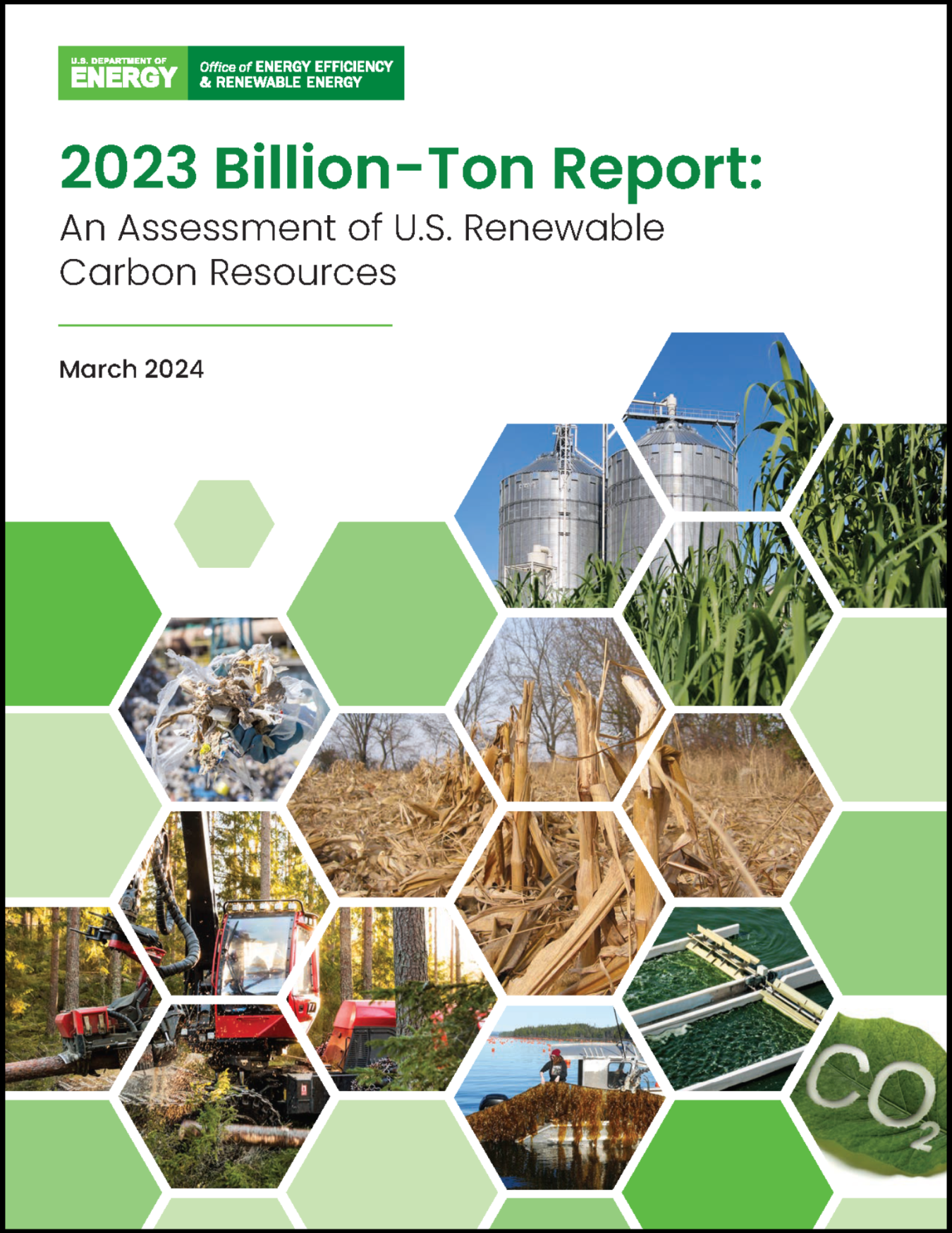
BT23 Key Findings and Impacts
Key findings of BT23 indicate that with potential biomass production, the U.S. could generate an estimated 60 billion gallons of low greenhouse gas liquid fuels. Currently untapped biomass resources alone could contribute an additional 350 million tons annually, effectively doubling the U.S. bioeconomy. The analysis ensures sustainable outcomes by accounting for potential risks to soil, air and water quality, water availability, and the imperative to protect America’s forests and biodiversity.
“It provides a great resource to our stakeholders, said Dr. Elless. “We want to emphasize that this is a projection that depends on future market maturity—not a prediction—but it gives some indication of where in the U.S. we can grow a billion tons of biomass—and it’s not all from one resource.”
The BT23 report analyzes the biomass production capacity of approximately sixty resources, several of which have never before been the subject of a DOE Billion-Ton assessment. These include winter oilseed crops, trees and brush harvested from forests to prevent wildfires, macroalgae such as seaweed cultivated in ocean farms, and carbon dioxide from industrial plants. Projections suggest that future advancements could unlock even more potential, with energy crops alone potentially yielding over 400 million additional tons per year.
“Energy crops are such a big component of the billion-ton projection,” said Dr. Elless. “Without energy crops, we don’t get there. So, we really must develop and deploy them wherever we can. If we can also lower carbon intensity and increase soil carbon, then it’s a win-win.”
The report highlights the importance of diversifying biomass sources and includes detailed insights into biomass production capacity at the county, regional, and national level as shown on the Bioenergy Knowledge Discovery Framework. It indicates the need for strategic planning and investment to support the growth of both rural and urban bioeconomies. Learn more about the 2023 Billion-Ton Report here.
Sustainability and Analysis: Dr. Elless’ Portfolio and BETO Impact
Dr. Elless has an extensive science background and received a B.S. degree in Geology and a M.S. degree in Soil Science from North Dakota State University, as well as a Ph.D. in Soil Science from the University of Maryland. He completed his postdoctoral training at Oak Ridge National Laboratory (ORNL) cleaning up uranium contaminated soils at a facility just outside Cincinnati, Ohio.
“It was a good opportunity for me to learn. I learned a lot about radionuclides and wrote a book chapter on it. That got me into the environmental aspect of soils,” said Dr. Elless.
After his time at ORNL, he worked as a soil scientist at a company in New Jersey doing phytoremediation, which uses plants to clean up heavy metals like lead, arsenic, and zinc in soils and waters. As the biofuels market grew, he eventually won a grant and worked for Edenspace Systems Corporation as Director of Grants and Technology, which focused on the engineering of lignocellulosic biomass for enhanced biofuel production. Prior to joining BETO in 2012, Dr. Elless was the Grants and Alliances Manager at FuturaGene, which focused on the development of woody biomass for biofuel production.
Dr. Elless spearheaded the release of the Billion Ton 2016 Report, BT23, and the release of the annual state of technology reports concerning the delivered costs for both woody and herbaceous biomass to biorefineries. Dr. Elless also noted the best use of biomass analysis that comes out of Oak Ridge as a significant resource for BETO.
Dr. Elless also works with the Feedstock-Conversion Interface Consortium (FCIC) where he oversees projects on feedstock variability and pre-processing. Funded and led by BETO, the FCIC is a consortium of researchers at nine national laboratories dedicated to reducing the risk of biorefinery scale-up.
“FCIC was set up to help make improvements after issues with biomass handling at biorefineries became known. We now have conversion standards and a good toolbox on what is necessary to achieve flowability,” said Dr. Elless.
Dr. Elless continues to work on projects centered on analysis and sustainability. BT23 serves as a foundational assessment that will help the U.S. tackle the climate crisis and support the Biden-Harris Administration’s whole-of-government approach to achieving net-zero emissions by 2050. READ MORE
Excerpt from U.S. Industrial Pellet Industry/Biomass Magazine: The U.S. Department of Energy 2023 Billion-Ton Report: An Assessment of U.S. Renewable Carbon Resources identifies sustainable forestry as a key pillar in the effort to increase the nation’s biomass production. Woody biomass accounts for more than 40% of total U.S. bioenergy consumption, helping lower greenhouse gas emissions across industrial, residential, and commercial applications.
The report estimates this contribution can grow significantly and within strict sustainability limits that ensures new capacity promotes net carbon sequestration, water regulation, protection of biodiversity, healthy communities, and many additional ecosystem services.
“These findings underscore that woody biomass is a sustainable, abundant resource, especially in our southern timberlands, which hold 46% of our nation’s total forests,” said Elizabeth Woodworth, interim executive director of the U.S. Industrial Pellet Association. “There is tremendous potential for our industry to expand both in production capacity and through new applications where solutions to de-fossilize operations are needed most.”
The U.S. is the world’s leading exporter of wood pellets used primarily to displace fossil fuels and generate reliable, low-carbon power and heat. It shipped 9.5 million metric tons valued at $1.75 billion to more than a dozen countries in 2023. READ MORE
Excerpt from U.S. Department of Energy: New deep-dive videos about the U.S. Department of Energy Bioenergy Technologies Office's (BETO's) 2023 Billion-Ton Report (BT23) are now available to help users access and apply the report findings and associated online data resources.
The BETO-funded BT23, developed by Oak Ridge National Laboratory (ORNL), is the latest in a series of comprehensive assessments examining the renewable carbon resources available in the United States. BT23 found that the U.S. has the potential to produce over 1 billion tons of sustainable biomass annually, with the possibility to triple bioenergy production and meet approximately 15% of the country’s future energy needs. These deep-dive videos break down the report’s key findings, exploring their significance to the economy, environment, and industry.
Stakeholders at every level—local, regional, and national—can use these new video resources to gain valuable insights into U.S. biomass potential. The detailed data provide insight to understand biomass production capacity, contributing to a strong bioeconomy and the development of sustainable, low-carbon energy solutions.
These videos, in addition to other easy-to-use tools to explore the nation’s bioenergy data, are available through the Bioenergy Knowledge Discovery Framework, or BioenergyKDF, data portal. The video playlist is also available on YouTube.
Available Video Resources:
- Introduction to the 2023 Billion-Ton Report ORNL’s Matthew Langholtz provides a summary of the BT23 findings.
- What’s in the 2023 Billion-Ton Report? ORNL’s Matthew Langholtz provides a short background summary for each of the resource classes and market scenarios explored in the BT23 report.
- BioenergyKDF: How to Access the Data ORNL’s Maggie Davis shares how to access the resources from BT23 using the Bioenergy KDF data portal.
- Interpreting Results of the 2023 Billion-Ton Report ORNL's Matthew Langholtz gives an in-depth look at the results of BT23 report.
- 2023 Billion-Ton Report: Macroalgae DOE contractor Anne Otwell explores the role of macroalgae in the bioeconomy.
Learn more about the BioenergyKDF, the nation’s most comprehensive source of data for bioenergy, providing equitable access to information in support of a data-driven, prosperous U.S. bioeconomy. READ MORE
Nearly 55,000 articles in our online library!
Use the categories and tags listed below to access the nearly 50,000 articles indexed on this website.
Advanced Biofuels USA Policy Statements and Handouts!
- For Kids: Carbon Cycle Puzzle Page
- Why Ethanol? Why E85?
- Just A Minute 3-5 Minute Educational Videos
- 30/30 Online Presentations
- “Disappearing” Carbon Tax for Non-Renewable Fuels
- What’s the Difference between Biodiesel and Renewable (Green) Diesel? 2020 revision
- How to De-Fossilize Your Fleet: Suggestions for Fleet Managers Working on Sustainability Programs
- New Engine Technologies Could Produce Similar Mileage for All Ethanol Fuel Mixtures
- Action Plan for a Sustainable Advanced Biofuel Economy
- The Interaction of the Clean Air Act, California’s CAA Waiver, Corporate Average Fuel Economy Standards, Renewable Fuel Standards and California’s Low Carbon Fuel Standard
- Latest Data on Fuel Mileage and GHG Benefits of E30
- What Can I Do?
Donate
DonateARCHIVES
- February 2026
- January 2026
- December 2025
- November 2025
- October 2025
- September 2025
- August 2025
- July 2025
- June 2025
- May 2025
- April 2025
- March 2025
- February 2025
- January 2025
- December 2024
- November 2024
- October 2024
- September 2024
- August 2024
- July 2024
- June 2024
- May 2024
- April 2024
- March 2024
- February 2024
- January 2024
- December 2023
- November 2023
- October 2023
- September 2023
- August 2023
- July 2023
- June 2023
- May 2023
- April 2023
- March 2023
- February 2023
- January 2023
- December 2022
- November 2022
- October 2022
- September 2022
- August 2022
- July 2022
- June 2022
- May 2022
- April 2022
- March 2022
- February 2022
- January 2022
- December 2021
- November 2021
- October 2021
- September 2021
- August 2021
- July 2021
- June 2021
- May 2021
- April 2021
- March 2021
- February 2021
- January 2021
- December 2020
- November 2020
- October 2020
- September 2020
- August 2020
- July 2020
- June 2020
- May 2020
- April 2020
- March 2020
- February 2020
- January 2020
- December 2019
- November 2019
- October 2019
- September 2019
- August 2019
- July 2019
- June 2019
- May 2019
- April 2019
- March 2019
- February 2019
- January 2019
- December 2018
- November 2018
- October 2018
- September 2018
- August 2018
- July 2018
- June 2018
- May 2018
- April 2018
- March 2018
- February 2018
- January 2018
- December 2017
- November 2017
- October 2017
- September 2017
- August 2017
- July 2017
- June 2017
- May 2017
- April 2017
- March 2017
- February 2017
- January 2017
- December 2016
- November 2016
- October 2016
- September 2016
- August 2016
- July 2016
- June 2016
- May 2016
- April 2016
- March 2016
- February 2016
- January 2016
- December 2015
- November 2015
- October 2015
- September 2015
- August 2015
- July 2015
- June 2015
- May 2015
- April 2015
- March 2015
- February 2015
- January 2015
- December 2014
- November 2014
- October 2014
- September 2014
- August 2014
- July 2014
- June 2014
- May 2014
- April 2014
- March 2014
- February 2014
- January 2014
- December 2013
- November 2013
- October 2013
- September 2013
- August 2013
- July 2013
- June 2013
- May 2013
- April 2013
- March 2013
- February 2013
- January 2013
- December 2012
- November 2012
- October 2012
- September 2012
- August 2012
- July 2012
- June 2012
- May 2012
- April 2012
- March 2012
- February 2012
- January 2012
- December 2011
- November 2011
- October 2011
- September 2011
- August 2011
- July 2011
- June 2011
- May 2011
- April 2011
- March 2011
- February 2011
- January 2011
- December 2010
- November 2010
- October 2010
- September 2010
- August 2010
- July 2010
- June 2010
- May 2010
- April 2010
- March 2010
- February 2010
- January 2010
- December 2009
- November 2009
- October 2009
- September 2009
- August 2009
- July 2009
- June 2009
- May 2009
- April 2009
- March 2009
- February 2009
- January 2009
- December 2008
- November 2008
- October 2008
- September 2008
- August 2008
- July 2008
- June 2008
- May 2008
- April 2008
- March 2008
- February 2008
- January 2008
- December 2007
- November 2007
- October 2007
- September 2007
- August 2007
- June 2007
- February 2007
- January 2007
- October 2006
- April 2006
- January 2006
- April 2005
- December 2004
- November 2004
- December 1987
CATEGORIES
- About Us
- Advanced Biofuels Call to Action
- Aviation Fuel/Sustainable Aviation Fuel (SAF)
- BioChemicals/Renewable Chemicals
- BioRefineries/Renewable Fuel Production
- Business News/Analysis
- Cooking Fuel
- Education
- 30/30 Online Presentations
- Competitions, Contests
- Earth Day 2021
- Earth Day 2022
- Earth Day 2023
- Earth Day 2024
- Earth Day 2025
- Executive Training
- Featured Study Programs
- Instagram TikTok Short Videos
- Internships
- Just a Minute
- K-12 Activities
- Mechanics training
- Online Courses
- Podcasts
- Scholarships/Fellowships
- Teacher Resources
- Technical Training
- Technician Training
- University/College Programs
- Events
- Coming Events
- Completed Events
- More Coming Events
- Requests for Speakers, Presentations, Posters
- Requests for Speakers, Presentations, Posters Completed
- Webinars/Online
- Webinars/Online Completed; often available on-demand
- Federal Agency/Executive Branch
- Agency for International Development (USAID)
- Agriculture (USDA)
- Commerce Department
- Commodity Futures Trading Commission
- Congressional Budget Office
- Defense (DOD)
- Air Force
- Army
- DARPA (Defense Advance Research Projects Agency)
- Defense Logistics Agency
- Marines
- Navy
- Education Department
- Energy (DOE)
- Environmental Protection Agency
- Federal Energy Regulatory Commission (FERC)
- Federal Reserve System
- Federal Trade Commission
- Food and Drug Administration
- General Services Administration
- Government Accountability Office (GAO)
- Health and Human Services (HHS)
- Homeland Security
- Housing and Urban Development (HUD)
- Interior Department
- International Trade Commission
- Joint Office of Energy and Transportation
- Justice (DOJ)
- Labor Department
- National Academies of Sciences Engineering Medicine
- National Aeronautics and Space Administration
- National Oceanic and Atmospheric Administration
- National Research Council
- National Science Foundation
- National Transportation Safety Board (NTSB)
- Occupational Safety and Health Administration
- Overseas Private Investment Corporation
- Patent and Trademark Office
- Securities and Exchange Commission
- State Department
- Surface Transportation Board
- Transportation (DOT)
- Federal Aviation Administration
- National Highway Traffic Safety Administration (NHTSA)
- Pipeline and Hazardous Materials Safety Admin (PHMSA)
- Treasury Department
- U.S. Trade Representative (USTR)
- White House
- Federal Legislation
- Federal Litigation
- Federal Regulation
- Feedstocks
- Agriculture/Food Processing Residues nonfield crop
- Alcohol/Ethanol/Isobutanol
- Algae/Other Aquatic Organisms/Seaweed
- Atmosphere
- Carbon Dioxide (CO2)
- Field/Orchard/Plantation Crops/Residues
- Forestry/Wood/Residues/Waste
- hydrogen
- Manure
- Methane/Biogas
- methanol/bio-/renewable methanol
- Not Agriculture
- RFNBO (Renewable Fuels of Non-Biological Origin)
- Seawater
- Sugars
- water
- Funding/Financing/Investing
- grants
- Green Jobs
- Green Racing
- Health Concerns/Benefits
- Heating Oil/Fuel
- History of Advanced Biofuels
- Infrastructure
- Aggregation
- Biofuels Engine Design
- Biorefinery/Fuel Production Infrastructure
- Carbon Capture/Storage/Use
- certification
- Deliver Dispense
- Farming/Growing
- Precursors/Biointermediates
- Preprocessing
- Pretreatment
- Terminals Transport Pipelines
- International
- Abu Dhabi
- Afghanistan
- Africa
- Albania
- Algeria
- Angola
- Antarctica
- Arctic
- Argentina
- Armenia
- Aruba
- Asia
- Asia Pacific
- Australia
- Austria
- Azerbaijan
- Bahamas
- Bahrain
- Bangladesh
- Barbados
- Belarus
- Belgium
- Belize
- Benin
- Bermuda
- Bhutan
- Bolivia
- Bosnia and Herzegovina
- Botswana
- Brazil
- Brunei
- Bulgaria
- Burkina Faso
- Burundi
- Cambodia
- Cameroon
- Canada
- Canary Islands
- Caribbean
- Central African Republic
- Central America
- Chad
- Chile
- China
- Colombia
- Congo
- Congo, Democratic Republic of
- Costa Rica
- Croatia
- Cuba
- Cyprus
- Czech Republic
- Denmark
- Dominican Republic
- Dubai
- Ecuador
- Egypt
- El Salvador
- Equatorial Guinea
- Estonia
- Eswatini/Swaziland
- Ethiopia
- European Union (EU)
- Fiji
- Finland
- France
- French Guiana
- Gabon
- Georgia
- Germany
- Ghana
- Global South
- Greece
- Greenland
- Grenada
- Guatemala
- Guinea
- Guyana
- Haiti
- Honduras
- Hong Kong
- Hungary
- Iceland
- India
- Indonesia
- Iran
- Iraq
- Ireland
- Israel
- Italy
- Ivory Coast
- Jamaica
- Japan
- Jersey
- Jordan
- Kazakhstan
- Kenya
- Korea
- Kosovo
- Kuwait
- Laos
- Latin America
- Latvia
- Lebanon
- Liberia
- Lithuania
- Luxembourg
- Macedonia
- Madagascar
- Malawi
- Malaysia
- Maldives
- Mali
- Malta
- Marshall Islands
- Mauritania
- Mauritius
- Mexico
- Middle East
- Moldova
- Monaco
- Mongolia
- Morocco
- Mozambique
- Myanmar/Burma
- Namibia
- Nepal
- Netherlands
- New Guinea
- New Zealand
- Nicaragua
- Niger
- Nigeria
- North Africa
- North America
- North Korea
- Northern Ireland
- Norway
- Oman
- Pakistan
- Panama
- Papua New Guinea
- Paraguay
- Peru
- Philippines
- Poland
- Portugal
- Qatar
- Republic of
- Romania
- Russia
- Rwanda
- Saudi Arabia
- Scotland
- Senegal
- Serbia
- Sierra Leone
- Singapore
- Slovakia/Slovak Republic
- Slovenia
- Solomon Islands
- South Africa
- South America
- South Korea (Republic of Korea)
- South Sudan
- Southeast Asia
- Spain
- Sri Lanka
- Sudan
- Suriname
- Sweden
- Switzerland
- Taiwan
- Tanzania
- Thailand
- Timor-Leste
- Togo
- Trinidad and Tobago
- Tunisia
- Turkey
- Uganda
- UK (United Kingdom)
- Ukraine
- United Arab Emirates UAE
- Uruguay
- Uzbekistan
- Vatican
- Venezuela
- Vietnam
- Wales
- Zambia
- Zanzibar
- Zimbabwe
- Marine/Boat Bio and Renewable Fuel/MGO/MDO/SMF
- Marketing/Market Forces and Sales
- Opinions
- Organizations
- Original Writing, Opinions Advanced Biofuels USA
- Policy
- Presentations
- Biofuels Digest Conferences
- DOE Conferences
- Bioeconomy 2017
- Bioenergy2015
- Biomass2008
- Biomass2009
- Biomass2010
- Biomass2011
- Biomass2012
- Biomass2013
- Biomass2014
- DOE Project Peer Review
- Other Conferences/Events
- R & D Focus
- Carbon Capture/Storage/Use
- Co-Products
- Feedstock
- Logistics
- Performance
- Process
- Vehicle/Engine/Motor/Aircraft/Boiler/Ship
- Yeast
- Railroad/Train/Locomotive Fuel
- Resources
- Books Web Sites etc
- Business
- Definition of Advanced Biofuels
- Find Stuff
- Government Resources
- Scientific Resources
- Technical Resources
- Tools/Decision-Making
- Rocket/Missile Fuel
- Sponsors
- States
- Alabama
- Alaska
- Arizona
- Arkansas
- California
- Colorado
- Connecticut
- Delaware
- Florida
- Georgia
- Hawai'i
- Idaho
- Illinois
- Indiana
- Iowa
- Kansas
- Kentucky
- Louisiana
- Maine
- Maryland
- Massachusetts
- Michigan
- Midwest
- Minnesota
- Mississippi
- Missouri
- Montana
- Native American tribal nation lands
- Nebraska
- Nevada
- New Hampshire
- New Jersey
- New Mexico
- New York
- North Carolina
- North Dakota
- Ohio
- Oklahoma
- Oregon
- Pennsylvania
- Puerto Rico
- Rhode Island
- South Carolina
- South Dakota
- Tennessee
- Texas
- Utah
- Vermont
- Virginia
- Washington
- Washington DC
- West Coast
- West Virginia
- Wisconsin
- Wyoming
- Sustainability
- Uncategorized
- What You Can Do
tags
© 2008-2023 Copyright Advanced BioFuels USA. All Rights reserved.
.jpg)





Comments are closed.